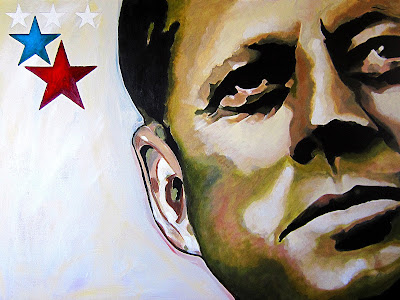During an evening black-out, when the fridge stopped humming, the TV went black, the music stopped, and the house seemed to suddenly become draped in mystery, I started to ponder what it would have been like before there was electricity. No streetlights, no traffic lights, no flickering, twinkling neon lights, no glowing, flowing, head and tail lights, just gentle, muted, occasional lights.
I searched for some candles and eventually found two stumps. I lit them. Their fragile flames provided some illumination, but the house still felt unfamiliar and mysterious.
Why was that?, I thought. I have lived in this place for more than ten years, everything is familiar to me, yet, when searching for the candles I bumped into things, tripped on the rug, and stepped in the cat's food bowl.
Some researchers suggest that hyper vigilance is an evolutionary response; we are more vigilant in darkness because it improves our survival. If such is the case, then now when a large part of the world is "electrified" and darkness can be eliminated with the flick of a switch, what happens to our vigilance? Does "the darkness" become even more threatening or have we perhaps become somewhat complacent?
Imagine walking through a park you know in daylight......now imagine walking through the same park in darkness......is there a difference? Tripping my way to find the candles, I realised that
there was a difference between what I thought I knew about my surroundings and what I actually knew. Without any light showing me where everything was, my estimations were skewed.
For a couple of years I worked as a manager for a jazz club in Stockholm, Sweden, and I never forget the first time I saw the club in daylight. At night, the club seemed cosy with all its small, red table lamps, the burgundy red velvet drapes, and sparsely lit bar, but in the cold, harsh, daylight, it looked seedy and ordinary. Illuminated with the uncompromising daylight, the bar looked cheap, the lamps grotty, and the stage overburdened with empty glasses, beer bottles, and cigarette butts. What had been "hidden", or glamorised in the dark, was now very visible, and no longer mysterious or romantic, just very ordinary. On the other hand, sometimes "light" may reveal to us unexpected, astonishing beauty; the sudden appearance of a rainbow, a ray of light finding its way to reveal a hidden flower, the sun emerging from behind a darkened cloud, moonbeams across a silent, still lake, fireworks exploding against a satin black sky.
As far as my understanding goes, light has been a source of fascination for mankind since the year dot. It has been scrutinized, investigated, researched, treated, experimented with, by scientists of various disciplines, artists, technicians, innovators, and everyday people. Light, is something experienced by us all. (Even if blind, a person can experience the effects of light such as the warmth.)
One may even ponder whether any form of life is possible without it....yet we seem to have a penchant for taking it for granted.
As well as the physical experience of light, light is often used as a metaphor. "You are the light of my life, suddenly he saw the light(insight), she found enlightenment, light is the truth, light is knowledge", etc...
“Darkness cannot drive out darkness: only light can do that. Hate cannot drive out hate: only love can do that.” (Martin Luther King Jr.)
“We can easily forgive a child who is afraid of the dark; the real tragedy of life is when men are afraid of the light.” (Plato)
“We've all got both light and dark inside us. What matters is the part we choose to act on. That's who we really are.” (J. K. Rowling)
So what is "the dark" and why is it commonly associated with something "bad"?
According to some, "the dark" represents the unknown, the dangerous, the scary, the unpredictable, the sad, the negative, .... (insert here what you think)..........., yet for others, not so much.
In the early days of human kind, humans were not at the top of the food chain, and survival meant learning that predators preferred the cover of darkness to hunt, so basically: there's danger lurking in the dark, so stay out of it. Perhaps as a result of this, subconsciously we grew to associate "the dark" with danger and possible death? Another possibility may also be that its hard to see anything in the dark and one may trip on things....
“I will love the light for it shows me the way, yet I will endure the darkness for it shows me the stars.” (Og Mandino)
If you experience a "black-out", don't curse the darkness, light a candle, because even the darkest of dark is no match for a single flame of light.





